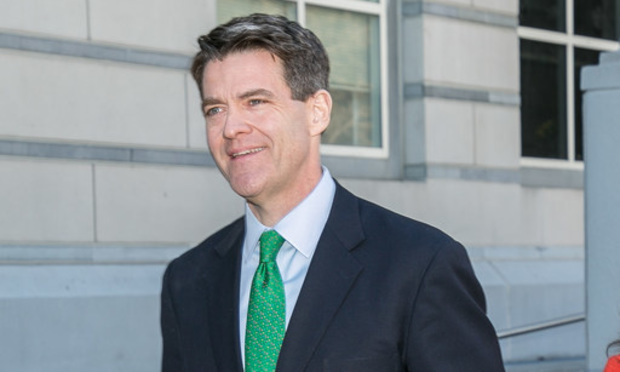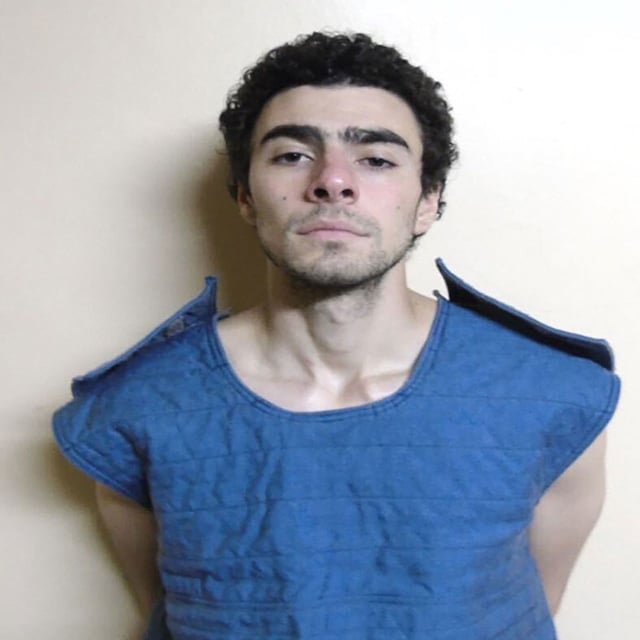Baroni Sentenced to 18 Months Behind Bars for Role in Bridgegate Scandal
William Baroni Jr. was also ordered to spend an additional 12 months in supervised release after completing his prison sentence.
February 26, 2019 at 04:20 PM
5 minute read
 William Baroni Jr./photo by Carmen Natale/ALM
William Baroni Jr./photo by Carmen Natale/ALM
A federal judge in Newark sentenced former Port Authority of New York and New Jersey Deputy Director William Baroni Jr. to 18 months in prison Tuesday for his role in a series of politically motivated George Washington Bridge lane closures.
Baroni was also ordered to spend an additional 12 months in supervised release after completing his prison sentence.
The sentence imposed by U.S. District Judge Susan Wigenton fell closer to the 18-24 months in prison that was requested by federal prosecutors, instead of the six months sought by Baroni's attorneys.
Baroni was sentenced to 24 months in prison in March 2017 after he and co-defendant Bridget Kelly were convicted in November 2016 on misuse and conspiracy to misuse government property, wire fraud and conspiracy to commit wire fraud, and depriving others of their civil rights and conspiracy to deprive others of their civil rights.
They were prosecuted for a series of closures to George Washington Bridge access lanes for a week in September 2013 as a means to create traffic gridlock in Fort Lee. The lane closures were an effort to take retribution against Fort Lee Mayor Mark Sokolich for refusing to endorse Gov. Chris Christie's re-election campaign. Kelly drew an 18-month sentence.
But the civil rights convictions were vacated by the U.S. Court of Appeals for the Third Circuit in November 2018, necessitating the need for resentencing.
After Wigenton issued the new sentence, Baroni spoke briefly to a group of media representatives gathered outside the courthouse, thanking his family and friends for their support. He added, “Now I will move on to the next chapter and continue to serve my community.”
Earlier, he told Wigenton he had been immersed in performing community service since his conviction and hoped for a lenient sentence so he could continue. He said he had shown poor judgment in the Bridgegate episode, which he blamed on a misguided allegiance to Christie.
“In the course of my career, I always thought I had a clear sense of right and wrong,” Baroni said. “That line disappeared when I went to work at the Port Authority, to work with Gov. Christie. I chose to get sucked into his cult and culture. When this idea [for the lane closures] came along, I no longer had that line between right and wrong. I want nothing more than to go back and be the person I was before and to make amends for what I did.”
Carlos Ortiz of Blank Rome, representing Baroni, said his client recognizes the lane closure scheme was “one of the most idiotic stunts in the history of Jersey politics,” adding that Baroni's subsequent attempt to cover up the scheme “absolutely was wrong. He completely lost his way.” Ortiz added that he expects Baroni to continue his efforts to help the LGBT community, teens who were victims of bullying and people who were homeless.
“I'm thrilled to see what happens next in his life,” Ortiz said.
But Lee Cortes Jr., who was part of the team that prosecuted Baroni, said the defendant had not made a meaningful acceptance of responsibility for his actions.
Cortes noted that while Fort Lee was in the throes of gridlock as a result of the plan imposed by Baroni, a paramedic crew had to park their ambulance and run through the streets with their medical equipment to reach a local resident who was having an emergency. Baroni was told about that episode after the first day of the lane closures, but took no steps to call off the scheme, Cortes said.
“Passage of time hasn't lessened how serious Mr. Baroni's conduct was,” Cortes said.
Ortiz told the judge he disputed the claim that Baroni had not taken responsibility for his acts.
Wigenton acknowledged Baroni's past community service and said she believed he will continue in the same manner. But, despite the Third Circuit's partial vacation of the conviction, Wigenton said, “I have to say the facts have not changed. The reality is, when you think about it, this was an outrageous display of abuse of power.”
Wigenton added that Baroni continued to make misrepresentations about what happened during the lane closures right up until his criminal trial. She added that there was a “need to communicate to the public that this type of behavior is unacceptable.”
Besides the prison and supervised release, Baroni is required to pay $14,314 in restitution, $7,500 in fines, and to perform 500 hours of community service. The Bureau of Prisons will determine the location where Baroni serves his sentence, Wigenton said.
The Third Circuit also ordered a new sentence for Kelly, but she has yet to exhaust her appeals of the criminal conviction. The Third Circuit declined to grant her an en banc rehearing of her appeal on Feb. 5, and she intends to file a petition for certiorari before the U.S. Supreme Court, her attorney, Michael Critchley Jr., said in a Feb. 8 letter to Wigenton.
The sentence also called for an additional 12 months of home confinement after all his jail time is served.
This content has been archived. It is available through our partners, LexisNexis® and Bloomberg Law.
To view this content, please continue to their sites.
Not a Lexis Subscriber?
Subscribe Now
Not a Bloomberg Law Subscriber?
Subscribe Now
NOT FOR REPRINT
© 2025 ALM Global, LLC, All Rights Reserved. Request academic re-use from www.copyright.com. All other uses, submit a request to [email protected]. For more information visit Asset & Logo Licensing.
You Might Like
View All

'You Became a Corrupt Politician': Judge Gives Prison Time to Former Sen. Robert Menendez for Corruption Conviction
5 minute read
‘The Decision Will Help Others’: NJ Supreme Court Reverses Appellate Div. in OPRA Claim Over Body-Worn Camera Footage
5 minute read
Trending Stories
Who Got The Work
J. Brugh Lower of Gibbons has entered an appearance for industrial equipment supplier Devco Corporation in a pending trademark infringement lawsuit. The suit, accusing the defendant of selling knock-off Graco products, was filed Dec. 18 in New Jersey District Court by Rivkin Radler on behalf of Graco Inc. and Graco Minnesota. The case, assigned to U.S. District Judge Zahid N. Quraishi, is 3:24-cv-11294, Graco Inc. et al v. Devco Corporation.
Who Got The Work
Rebecca Maller-Stein and Kent A. Yalowitz of Arnold & Porter Kaye Scholer have entered their appearances for Hanaco Venture Capital and its executives, Lior Prosor and David Frankel, in a pending securities lawsuit. The action, filed on Dec. 24 in New York Southern District Court by Zell, Aron & Co. on behalf of Goldeneye Advisors, accuses the defendants of negligently and fraudulently managing the plaintiff's $1 million investment. The case, assigned to U.S. District Judge Vernon S. Broderick, is 1:24-cv-09918, Goldeneye Advisors, LLC v. Hanaco Venture Capital, Ltd. et al.
Who Got The Work
Attorneys from A&O Shearman has stepped in as defense counsel for Toronto-Dominion Bank and other defendants in a pending securities class action. The suit, filed Dec. 11 in New York Southern District Court by Bleichmar Fonti & Auld, accuses the defendants of concealing the bank's 'pervasive' deficiencies in regards to its compliance with the Bank Secrecy Act and the quality of its anti-money laundering controls. The case, assigned to U.S. District Judge Arun Subramanian, is 1:24-cv-09445, Gonzalez v. The Toronto-Dominion Bank et al.
Who Got The Work
Crown Castle International, a Pennsylvania company providing shared communications infrastructure, has turned to Luke D. Wolf of Gordon Rees Scully Mansukhani to fend off a pending breach-of-contract lawsuit. The court action, filed Nov. 25 in Michigan Eastern District Court by Hooper Hathaway PC on behalf of The Town Residences LLC, accuses Crown Castle of failing to transfer approximately $30,000 in utility payments from T-Mobile in breach of a roof-top lease and assignment agreement. The case, assigned to U.S. District Judge Susan K. Declercq, is 2:24-cv-13131, The Town Residences LLC v. T-Mobile US, Inc. et al.
Who Got The Work
Wilfred P. Coronato and Daniel M. Schwartz of McCarter & English have stepped in as defense counsel to Electrolux Home Products Inc. in a pending product liability lawsuit. The court action, filed Nov. 26 in New York Eastern District Court by Poulos Lopiccolo PC and Nagel Rice LLP on behalf of David Stern, alleges that the defendant's refrigerators’ drawers and shelving repeatedly break and fall apart within months after purchase. The case, assigned to U.S. District Judge Joan M. Azrack, is 2:24-cv-08204, Stern v. Electrolux Home Products, Inc.
Featured Firms
Law Offices of Gary Martin Hays & Associates, P.C.
(470) 294-1674
Law Offices of Mark E. Salomone
(857) 444-6468
Smith & Hassler
(713) 739-1250






